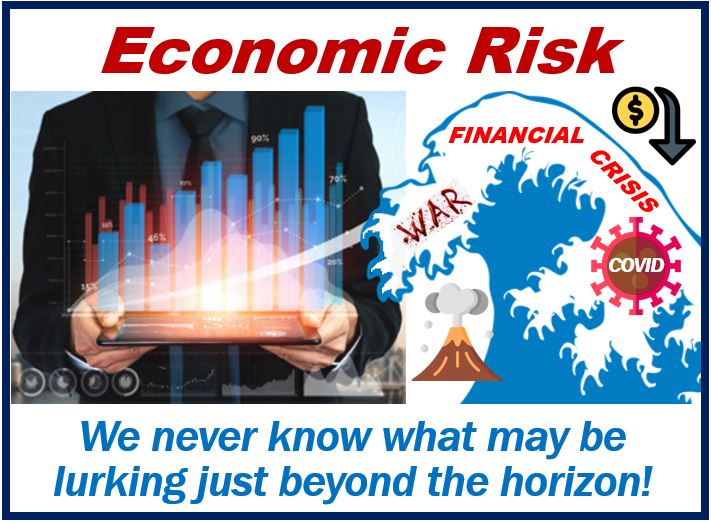What is economic risk? Definition and example
“Economic Risk refers to the likelihood that macroeconomic conditions (conditions in the whole economy) may affect an investment or a company’s prospects domestically or abroad.
The economic risks may include exchange rate fluctuations, a shift in government policy or regulations, political instability, or the introduction of economic sanctions.
Financial analysts use a variety of econometric models and indicators, such as the Economic Uncertainty Index, to quantify and forecast these economic risks.

Doing business and investing money always comes with an element of risk. Economic risks are often the most difficult to foresee. While today the horizon at home or in a specific foreign country may seem clear and promising, dark clouds can rapidly bubble up, thus changing the whole business environment.
In project financing, economic risk is the likelihood that a project’s output will not have a sale value that will cover its operating and maintenance costs, as well as its debt service requirements.
An example of economic risk
Imagine a new left-of-center political party wins the general elections in a country where your oil & gas company, XYZ Inc. operates and has invested heavily.
After two years, the party’s policies shift further to the left, and the president and cabinet members start aiming their rhetoric at the private sector, particularly foreign-owned companies.
One day the president announces that the oil & gas industry will be nationalized. Your company is offered compensation which significantly undervalues its true worth.
The risk of losing that operation abroad due to nationalization has become a reality. Your company loses a lot of money and is unlikely to recoup its investment, even if you take the foreign government to international tribunals.
Companies that operate or operated in Venezuela have suffered similar problems, as well as a plummeting local currency and a raft of new anti-business legislation.
Economic risk is an important factor
Before considering whether to go ahead with a new project, it is vital to factor in the economic risk, and to only proceed if the potential risks are significantly outweighed by the likely benefits.
While economic risk tends to refer to doing business or investing abroad, things can also go wrong at home – the term applies to any country, including your own.
Investing Answers has the following definition of the term:
“Economic risk refers to the possibility that changes in macroeconomic conditions will negatively impact a company or investment. For instance, political instability or exchange rate fluctuations can impact losses or gains.”
S&P Economic and Industry Trends
American financial services company Standard & Poor’s (S&P) publishes Economic and Industry Trend scores, which estimate economic risk in a number of countries.
The company uses the following qualifiers to signal trends in economic and industry risk:
-
Positive
Positive means it thinks the country’s economic or industry risk score may improve over the next six months to two years.
-
Stable
In this case, it believes the score will remain unchanged over the next six months to two years.
-
Negative
Negative means it thinks the score will deteriorate over the next six months to two years.
According to S&P:
“We apply a positive or negative qualifier when we believe there is at least a one-in-three likelihood that a trend may lead to a change in economic or industry risk scores in a banking sector, typically in the next six months to two years.”
To mitigate economic risk, companies often diversify their investments and seek to hedge against potential losses through various financial instruments and insurance products.
“Risk,” vocabulary and concepts
There are many terms in Business English related to “risk.” Let’s have a look at some such compound phrases, their meanings, and how we use them in a sentence:
-
Credit Risk
Possibility of loss from a borrower’s default, i.e., the borrower not paying back a debt.
Example: “Lenders evaluate credit risk to determine interest rates.”
-
Operational Risk
The risk of loss resulting from inadequate or failed internal processes, people, systems, or external events.
Example: “The company audited their procedures to minimize operational risk.”
-
Market Risk
The risk of losses in positions arising from movements in market prices.
Example: “Investors often diversify to reduce market risk.”
-
Reputation Risk
The risk of loss resulting from damages to a firm’s reputation.
Example: “Celebrity endorsements can increase reputation risk.”
-
Liquidity Risk
The risk that a business will not be able to meet its financial obligations as they fall due because it cannot convert assets to cash fast enough.
Example: “The firm managed its cash flow to avoid liquidity risk.”
-
Compliance Risk or Non-Compliance Risk
The risk of legal or regulatory sanctions, material financial loss, or loss to reputation a company may suffer as a result of its failure to comply with laws, regulations, or rules.
Example: “New laws have heightened the company’s compliance risk.”
2 Educational Videos
These two videos come from our sister channel on YouTube – Marketing Business Network. One is about “Economic Risk” and the other is about “Market Risk.” They use easy-to-understand language and examples.
-
What is Economic Risk?
-
What is Market Risk?

